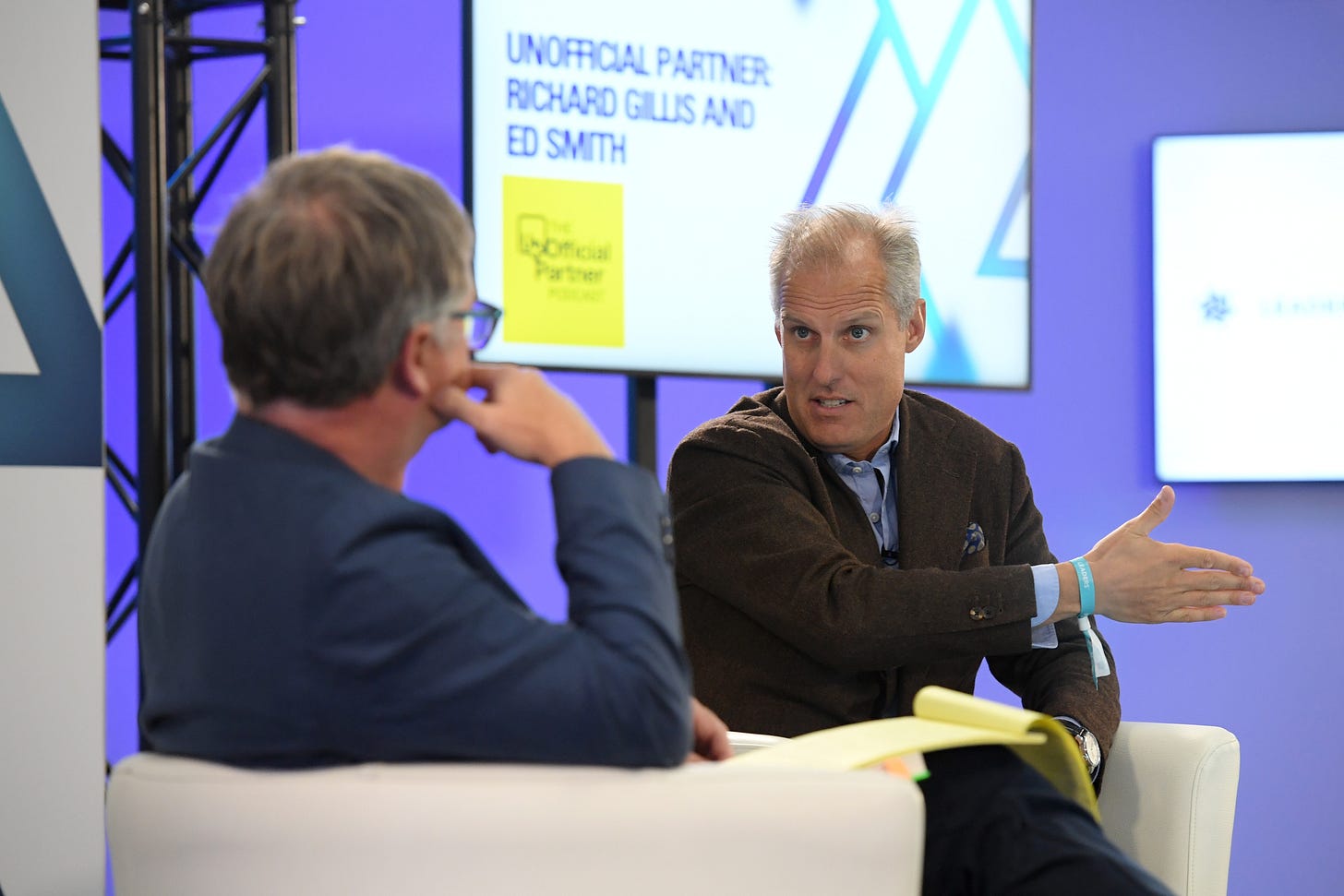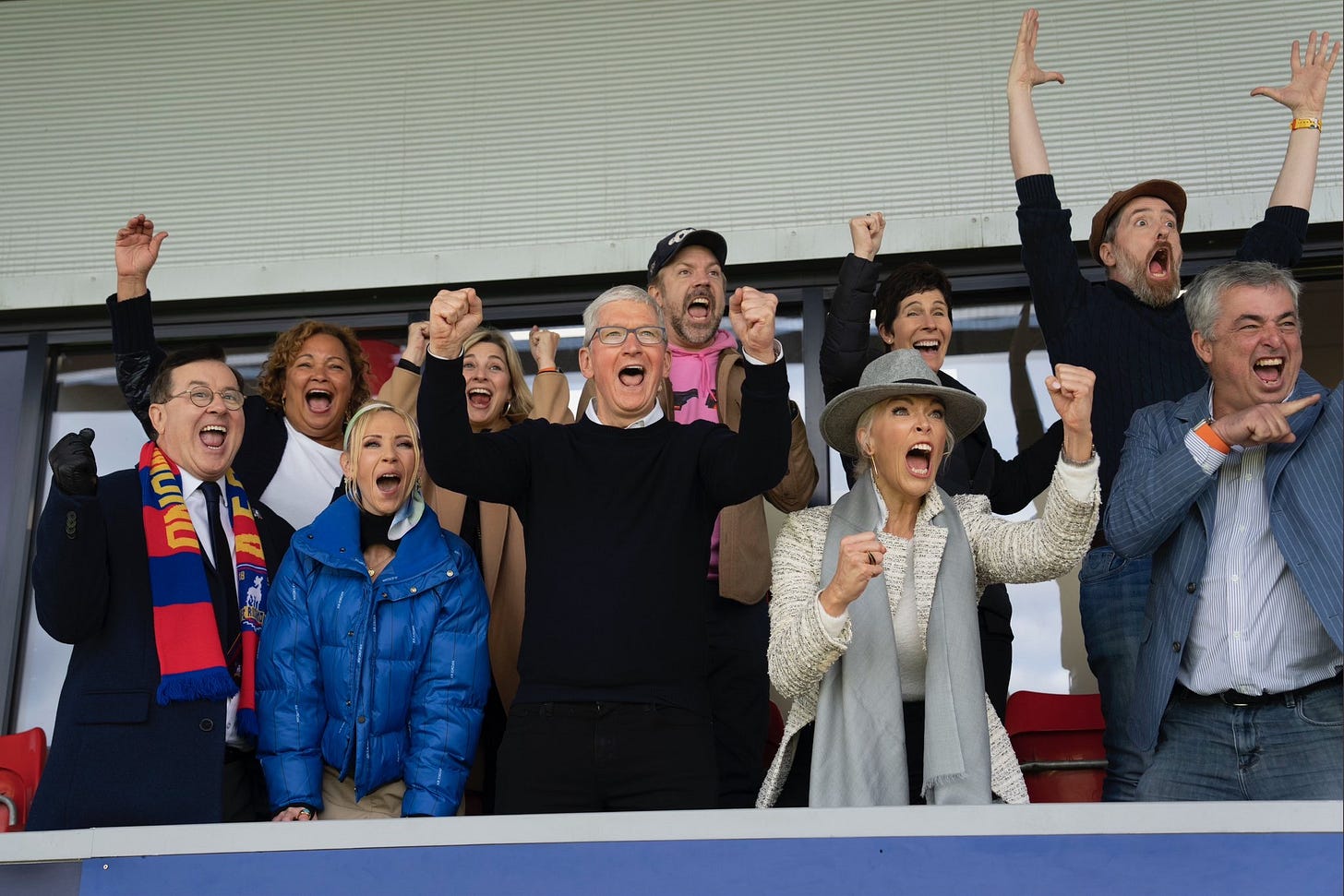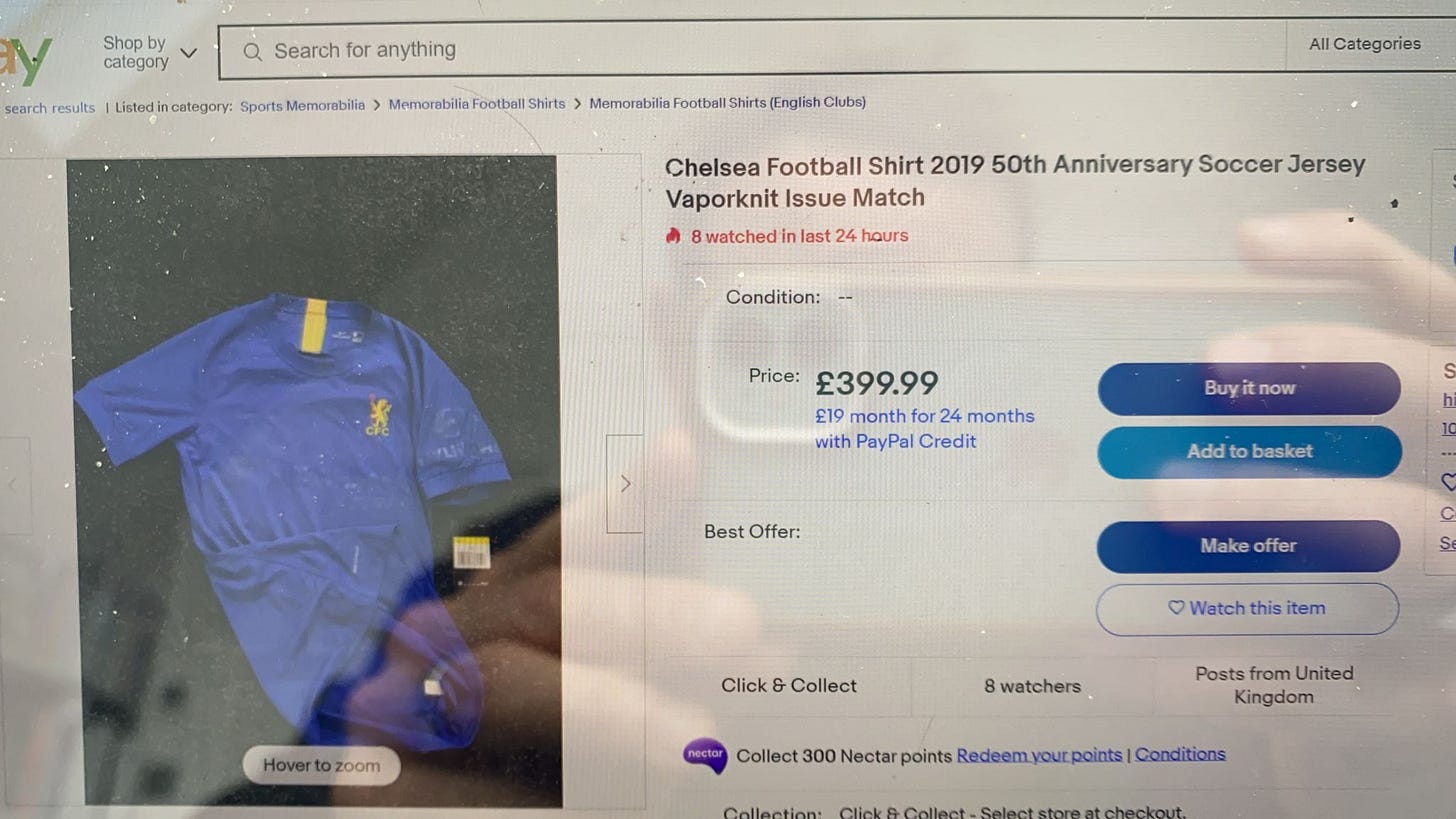UP x Ed v The machines; Hummel’s kit politics; When Apple buys the Premier League; Truthiness; Kara Nortman on Angel City; Kasparov is a smart one; Can Americans love relegation;
Overthinking the sports business, for money
The Unofficial Partner roadshow visited Leaders this week.
Always a fun conversation with Ed Smith. We’ll put the podcast out next Tuesday.
Five things that stuck with me.
‘Anything we know how we do, machines will do it better’. Gary Kasparov.
‘The more we understand what machines can do, the more it shines a light on the special qualities of human intelligence: imagination, analogy, making unpredictable connections.’ This made me think about how we educate our kids, pushing them down subject specific rabbit holes, still rewarding memory in the age of Google.
Talent spotting is sometimes blindingly obvious. Kevin Pietersen was always going to be a superstar. But in the words of Rasmus Ankersen, Brentford’s performance guru: ‘You need to spot talent that whispers, not just the talent that shouts’. See also, Zidane when Real Madrid sold Makele and bought Beckham: ‘Why put another layer of gold paint on the Bentley when you are losing the entire engine?’ The data can miss what biologists call ‘swarm harmonisers’, individuals who improve the whole.
It’s helpful to be good looking. Michael Lewis mentioned in a recent podcast that the Oakland As were ‘surprisingly ugly’. That’s all part of the equation. We fall in love with good looking players and search for evidence in the data to support this hunch. Billy Beane was famously good looking, which he felt helped coaches over rate him as a baseball player.
The IPL as trading floor. Intensity is essential in driving innovation. Many of references in Ed’s book come from finance. Howard Marks, Mervyn King, Nassim Taleb. Billy Beane borrowed the concept of arbitrage from hedge fund world where the premium on good decisions is immediate and valuable. The IPL has been where the most intense experimentation in data decision making has taken place. And some people used to say it was ‘mickey mouse cricket’. You don’t hear that much anymore.
Ed’s book is great addition to the debate on decision making in the era of big data. And keep an eye out for the international growth of the Institute for Sport Humanities, founded by Ed.
How American sports investors finally learned to stop worrying and love the drop.
I asked Kara Nortman to frame relegation risk.
This week’s podcast features Nortman, who along with Natalie Portman and Julie Uhrman, is co-founder of Angel City, the most interesting new team brand to emerge in recent years.
The closed nature of the NWSL means the risk of Nortman’s (and the star studded roster of minority partners) investment in Angel City is limited: They won’t get relegated, because there is no relegation.
But she was very good on what happens when you frame the buying of a football club via the VC lens.
The set up was me asking whether these two worldviews ever coexist happily, specifically, European football’s promotion/relegation culture versus the ‘American view’ of asset ownership.
Nortman: I think they can meet as long as people really understand their risk profile and why they're in the asset class. I mean, in a lot of ways, there's an analogy in venture capital in America, right? If you invest in only one tech startup, the odds of it not working are probably 95%, right?
So you're taking a 5% chance as an angel investor. So why do you do it? Well, when I talk to people about this I say: do it in an area where you find joy and that you wanna learn from.
This is about knowing the risk profile. As a financial person, I can make the case for why everyone should have exposure to the NWSL and the Premier League, both of 'em. I mean the Premier League is clearly the top league in the world with a built in moat and joy…so I'll take a 5% chance on a relegation risk. And the upside's pretty meaningful, right? Some teams are probably not going anywhere. Some teams, there's risk, you know, and there are ways to de-risk it. But I think it's really good over the long run to have different kinds of owners and different kinds of perspectives come in - in the US too.
When Apple buys the Premier League, they’ll show this picture
A pic from Apple’s hospitality box at Wembley during England v Germany this week.
An unusually animated Apple CEO Tim Cook with the cast of Ted Lasso.
The component parts are in place for a great truthiness story, defined as a story that has no factual basis but just sounds right. (HT Stephen Colbert).
Apple Buys The Premier League: one ticket, every game, suddenly Apple TV is relevant. It started in that Wembley box, when the famously undemonstrative tech billionaire CEO got football.
I’ve heard sillier stories recently, tbh.
Counter noise: Given how hugely influential Martin Samuel is on the rest of the football media, I fully expect others to get behind his plea for Premflix, regardless of whether it’s a good idea or not:
The problem with the proposal for a Premier League Drive To Survive is very simple. It’s small-time.
Small thinking, small in its imagination, it’s only a big idea in the minds of people with no thought for how truly gargantuan football could be.
Why does football need Netflix anyway? Why does it need Sky, for that matter, or any streaming service to air its product? Why can’t it go it alone? Show its own product, on its own network, with its own subscribers, and make its own Drive To Survive to accompany that.
Btw, Drive to Survive is becoming a cult.
Apple and sport pt2 - Trapital’s piece on the Super Bowl half time buy
One of US sport’s biggest properties has moved from Pepsi to Apple.
“Do you really want to sell sugar water for the rest of your life? Or do you want to come with me and change the world?”
Steve Jobs to then-Pepsi CEO John Sculley in 1983 to convince him to join Apple.
Summary: it’s about domestic saturation, international reach, and selling product (obvs).
“I put Spotify’s US subscriber number at right about 45 million, Apple at 49 million, you dump on top YouTube, Amazon, Pandora, you’re well past 110, 120 million…This is crucial, because if you look at what Apple One’s bundle is doing, $30 a month for news, music, television, gaming, fitness and two TBs of storage per six accountholders is a household proposition. They’re saying to the home, I got you convenience…So when you have 110 million households, and you have more than 110 million subscribers in the United States, then we’re in a race to the finishing line before herbivores turn into carnivores.”
Trapital: The NFL households who aren’t already paying for one of these services are likely more rural and have less willingness to pay for Apple Music, Apple TV+, or the Apple One’s bundle. The bigger opportunity for Apple Music and the Super Bowl is to expand the halftime show’s international reach. American football may not be as attractive across the world, but the halftime show is! An Apple Music livestream can decouple the musical performance from the game itself. Watching U.S. broadcast TV can sometimes be a challenge for people outside of the U.S., but streaming makes it more accessible. International markets are where most streaming and subscription-based products have had faster growth in recent years. And since music’s digital streaming providers have become more commoditized, valuable differentiated content is a win.
Kit politics
Your reaction to Hummel’s human rights stand reveals what sort of person you are.
Nice - Good on them, so brave*.
Nasty - Great PR gag: Have you ever put Hummel and human rights in the same sentence before?
This nice/nasty test can be applied to David Beckham’s recent work.
As in..
Nice: God bless Becks, queueing for the Queen, like a normal bloke.
Nasty: The queue gave him useful PR collateral in the run up to Qatar, for which he’s trousered many millions to plug.
See also: Eric Cantona didn’t love that decision.
Whatevs.
*A core UP rule: Be wary of marketing people calling each other ‘brave’.
Btw, this is brave:

This is a good thread on Hummel and the complexities of Qatar.

Amoral investment tip: Buy every Hummel-free Denmark kit you can get your hands on, history suggests their value will rise post-Qatar.
From WhatsUP:
He’s not kidding…400 quid for a Chelsea top, ffs?
One other Qatar related conundrum being talked about in the corridors at Leaders:
Strategy brainstorm: Should OUR BIG FIFA PARTNER CLIENT activate its rights around Qatar, particularly given the eye watering cost of media in the run up to Christmas?
Job of the Week
The Job: Digital Manager - British & Irish Lions
The Blurb:
The British & Irish Lions are inviting applications for the permanent role of ‘Digital Manager’.
The role will report to the Director of Digital, Marketing & Communications and is a fantastic opportunity to lead the digital affairs of the most famous touring side in world sport.
The Link: Apply here.






